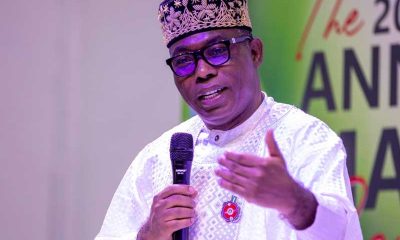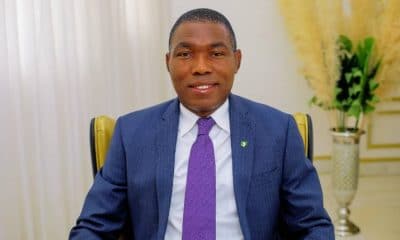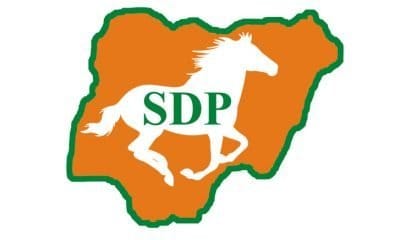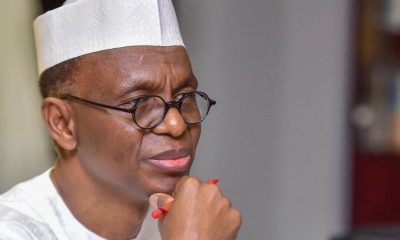Politics
What Annulment Of June 12 Did To Nigeria – Late Abiola’s Party, SDP
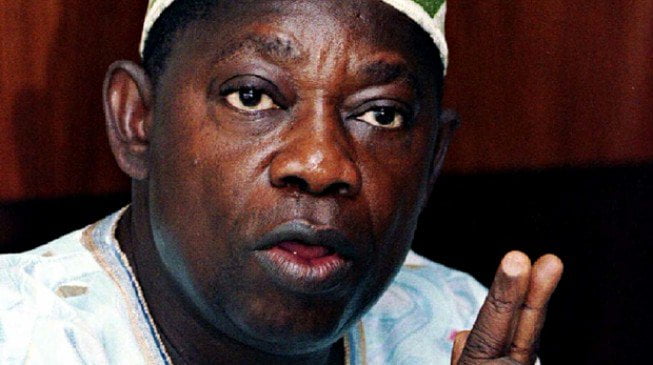
The Social Democratic Party, SDP, has today lamented the annulment of the June 12, 1993, Presidential election.
According to the party, the incidence was a sad development which contributed to the lack of progress in the nation’s political and socio-economic aspect.
The party, in its Democracy Day commemoration message tagged “Beyond the Symbolism of June 12,” signed by the Acting National Chairman, Professor Tunde Adeniran, commended President Muhammadu Buhari for taking the bold step in making the historic day a national holiday even as it chided past democratic administrations for glossing over the date.
The SDP, which was the party on which Moshood Kashimawo Olawale (MKO) Abiola ran for the presidential seat opined that June 12 represents a day when Nigerians regardless of their faith supported a Muslim-Muslim ticket to cast their ballot in an election which was believed as the freest and fairest in the political history of the nation.
The message read: “It is widely believed across the country as well as in the outside world that Nigeria would have made real progress in critical areas of infrastructural development and welfare of Nigerians if he (Abiola) was was allowed to lead the country as President and to implement his grand ideas.
“In the annals of our nation’s political history and democratic evolution, the date, June 12, has come to symbolize the most epochal national event of contemporary Nigeria. It was a historic day when Nigeria truly existed as a nation through the unprecedented action of her disparate people who demonstrated, through the power of the ballot, the right sense of nationhood that transcended our bifurcating polarities. The momentous event of that day was, perhaps, one of the finest moments of our national life.
June 12 epitomizes unbreakable will of Nigerians in face of tyranny- Ihedioha(Opens in a new browser tab)
“Abiola, a first-rate accountant and business mogul cum politician, emerged as the defining symbol of the unity in diversity of modern Nigeria. Notwithstanding his Muslim-Muslim ticket with Ambassador Babagana Kingibe as the candidates of the Social Democratic Party, SDP, they were massively voted for by the Nigerian electorate across the north and south divides of the country and across religious lines, thereby defeating Bashir Tofa Muslim-Christian ticket of the National Republican Convention, NRC. But quite sadly and inexplicably, the election was annulled, thereby aborting, yet, the bright prospects of Nigeria for greatness. Quite interestingly, as it was demonstrated by that election, religion did not in any way matter in voters’ decision on that fateful day as Nigerians momentarily buried the twin evils of ethnic bigotry and religion.
“Quite naturally, and expectedly, the decision of the Buhari administration to declare June 12 as the nation’s new Democracy Day in honour of the role of MKO Abiola elicited excitement for true patriots and genuine democrats, especially the front line active players and actors in the struggle against the military occasioned by the shocking annulment of that presidential election that was adjudged as freest and most credible in Nigerian history. There is no gainsaying that the singular action of that declaration will ever remain one of President Buhari’s enduring legacies, especially bearing in mind the fact that we have had three democratically elected presidents before him, but none gave consideration to the need of revisiting the pride of place of June 12 in the democratic dispensation that brought them to power.”
The statement called on the government to move beyond declaring the date a national holiday to muster the political will to deliver on the ideals the late Abiola laboured and eventually paid the supreme price.
“In the spirit of June 12, and the ideals of human dignity, freedom from want and pervasive poverty which Abiola lived his adult life in promoting, the SDP is committed to working to lift out of the vicious cycle of poverty, the over 90 million Nigerians that are reportedly living in extreme poverty. We should all be committed to promoting the building of a nation run on the pivotal pillars of truth, justice, reconciliation, integration and national unity. We must commit ourselves to ensure that no more shall any Nigerian be too poor to access the very basic necessities of life.
“It is important that governments at all levels, as well as the political elite in general, focus on and work towards achieving the great potentials of the country. We must consolidate the democracy that Abiola and other martyrs laboured and died for to make significant meaning in the life of the average Nigerian,” it added.
“We must strive to build a governance system that caters to the need of one and all of us. Our democracy and governance system must not allow for a situation where one Nigerian is perceived to be more Nigerian than the other. We need to build upon the gains of our democracy by entrenching and strengthening our democratic culture very strongly to safeguard people’s sovereignty.
“Our leaders must be made to sign on to the ever-strident clamour for restructuring and re-working of our polity and come up with a focused and deliberate governance reform agenda that is aimed at meaningful growth and sustainable national development,” it further noted.





